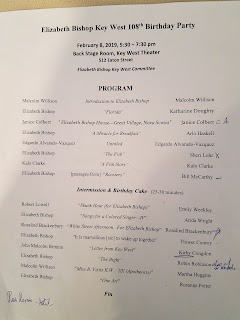There was a substantial gap between Bishop’s 10 October 1961
letter and her next, dated “New York
— December 12th 1961.” Bishop and Lota had left Brazil early in November, “We got
here the 10th, I think it was,” she wrote to Grace, “I’m not sure of that now.”
Then, in mid-thought she recalled, “no the 8th.” She knew she hadn’t “written
to you in ever so long,” couldn’t remember if she’s written “after [Aunt] Mary
left Rio.” Since that time, “so many things have
been happening.”
They were in New York City so Bishop could work on the
Time-Life book about Brazil, which was supposed to take about three weeks to
complete, but “it’s four now and I am still working like mad and don’t see much
hope for ending it ever.” Things with this fraught project were not going well.
Bishop moaned, “I have never worked so hard in my life and never been so
tired.” The work itself would have been the main fatigue factor, but being back
in the US
in winter would also have brought some culture shock and even disorientation,
along with excitement.
Even with all the effort she was giving it, Bishop
concluded, “the book about Brazil
is still going to be awful!” She noted that “it has been an interesting
experience — but never again,” at least not for the current outfit. Her long
distance view from Brazil
had not been overly confident, but upon meeting the editors, she declared,
“they are incredible people and what they know about Brazil would fit on the head of a
pin.” In spite of this ignorance, they still had “gall … arrogance … general
condescension!” All characteristics Bishop could not abide. She did tell her
aunt that she felt, even with all of this, “I’ve saved some of the book, and it
does tell the truth, more or less.” She noted weakly that “some of the pictures
are pretty — but not nearly enough.” She also reported that Grace would “be
getting a copy — I’m not sure when — March, maybe.” Grace did receive her copy
in due time. It is housed at Acadia University Archives in Wolfville, N.S.
After this frustrated update, Bishop turned to other
matters, even though she had “scarcely seen or done anything.” She had managed
to see “friends in the evenings a few times,” but she had to get “up at six to
start work (they give me chapters to bring home every night!).” She reminded
Grace, “Lota is with me,” and that they were “staying at a friend’s studio in Greenwich Village” (Loren MacIver’s apartment), not too
far from “where my old garret used to be.” They had this comfortable accommodation
because Loren and her husband Lloyd Frankenberg “are in Europe.”
(Bishop lived at 16 Charles St. in Greenwich Village
in the mid-1930s. This is her painting of 41 Charles St.,
not too far away. The McIver abode was in this neighbourhood.
From Exchanging Hats, p., 2-3.)
Bishop was typing Grace’s letter on Lloyd’s “typewriter — vintage 1920, I
think.” This instrument was “a huge old Underwood I can’t see over at all.” In
addition, there was “no lamp to type by.” This letter, on a piece of air mail
stationary, is very faint in the photocopy I received from Vassar, quite unlike
the regular letters Bishop typed in Brazil.
(The sort of typewriter of which she speaks.
We can't even imagine such a machine these
days when all we do is touch a screen and
presto, something appears.)
Bishop’s usual “—//” signalled a shift of subject. Bishop
reported that the previous week she had gone to Worcester, “my only day off and
not a very gay one, as you can imagine.” She flew there in the morning and
returned in the evening, “(in a snow storm).” She went to see Aunt Florence, of
course, but first connected with her cousins “Nancy and Kay [who] met me.”
After the visit with Florence,
Bishop had lunch with these cousins, plus another relative, “Priscilla Coe.”
Grace would have known who all of these people were. Still more relatives were
visited, “the Fultons
to see his many children.” Not quite sure who this latter person is, but
perhaps he had been married to one of Bishop’s paternal aunts. After all this
reunion, Bishop told Grace that she “called on Aunt F again,” on her own. She
reported that “the nursing home is NOT good — it has recently changed hands and
gone down hill.” In spite of this deterioration, somehow Florence “has been much better — at least she
seems much happier, doesn’t make scenes, etc., etc.” She noted that her aunt
“is terribly frail and seemed sadly changed to me.” Surely this could not have
been surprising to Bishop. How many years had it been since Bishop had seen Florence, perhaps
decades?
Also not surprisingly, Florence
“doesn’t remember much — just in spots — but I’m sure you know all about it,”
meaning that Grace would understand such diminishment from her nursing of
elderly patients. Bishop felt that her aunt had tried “hard for my sake, poor
old thing.” She even “asked about ‘politics’ in Brazil.” Then she “asked my age
and when I said 50 she said, ‘Oh no dear — you must be wrong — Auntie is only
48 so you can’t be 50’.”
Having had such a fraught relationship with this paternal
aunt, one wonders why Bishop made the effort to see this frail elderly woman,
with whom she had very little bond. Still, she made the effort, probably out of
a sense of duty. Florence
was the last Bishop, the last of her father’s generation.
Bishop dropped this sad subject and turned to other
activities she had managed in the midst of her exhausting slog on the Brazil book.
The next post will turn to those activities.






















